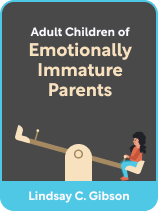

This article is an excerpt from the Shortform book guide to "Adult Children of Emotionally Immature Parents" by Lindsay C. Gibson. Shortform has the world's best summaries and analyses of books you should be reading.
Like this article? Sign up for a free trial here.
What is the book Adult Children of Emotionally Immature Parents about? What are the main takeaways of the book?
In the Adult Children of Emotionally Immature Parents book, Lindsey Gibson looks at traits of emotionally underdeveloped parents and how they affect children into adulthood. She also provides strategies the children can use to heal and move forward.
Read below for a brief overview of Gibson’s book.
Adult Children of Emotionally Immature Parents by Lindsey Gibson
In the Adult Children of Emotionally Immature Parents book, psychologist Lindsey Gibson dispels the myth that “parents know best,” revealing the lifelong damage that emotionally neglectful parents can do to their children. Gibson explores key features of emotionally underdeveloped parents and the impact of their behavior on their children. She also provides strategies to help adults who suffered childhood emotional neglect turn their relationship with their parent from toxic to tolerable, and develop healthier emotional connections with others.
Gibson is an adult psychotherapy and personal growth counseling specialist. She wrote Adult Children of Emotionally Immature Parents to help survivors of emotional neglect free themselves from dysfunctional relationships with their parents and find emotional fulfillment.
In her book Gibson examines:
- Features and types of emotionally underdeveloped parents
- Coping mechanisms children employ to survive emotional neglect
- Challenges that adult children of emotionally immature parents face
- Ways to heal and move forward from childhood emotional neglect
Note: Throughout this article we’ll refer to “you” as the adult child of an emotionally immature parent, and “your parent” as an emotionally immature parent.
Part 1: Understanding Emotionally Immature Parents and Their Impact
Gibson argues that understanding how your parents came to be emotionally underdeveloped reveals information that can help you navigate your relationship with them. Not all parents who emotionally neglect their children do so intentionally or maliciously. Knowing why your parents operate the way they do can help you choose how—and how much—to interact with them.
(Shortform note: Gibson emphasizes understanding your emotionally neglectful parent’s behavior, which is the first step of forgiving them. Experts say that to forgive an abusive parent, they must first acknowledge and take responsibility for their behavior. Forgiving them without this acknowledgment is psychologically meaningless and can worsen your emotional damage.)
Generally speaking, emotionally immature parents grew up with a caretaker who severely restricted their ability to express their emotions. Children deprived of the opportunity to express a full range of their true feelings, or who learn that some feelings are unacceptable, can’t develop an integrated sense of self. Instead, their energy goes into building their defenses, which take over and become so intertwined with who they are that they’re intractable. What’s left is a person who’s a patchwork of unpredictable, inconsistent feelings.
When highly defensive children grow up and become parents, their capacity to have healthy relationships with their own children is restricted because they lack the tools needed to engage in emotionally healthy ways. Their ability to change this depends on whether they can self-reflect. Most, unfortunately, cannot.
By contrast, Gibson defines emotionally mature parents as caretakers who are comfortable with emotions and attuned to their children’s emotional needs. Emotionally mature parents create a sense of security for their children by consistently demonstrating an interest in their well-being, validating their emotions, showing affection and comfort, and being emotionally dependable.
Part 2: How Children Cope With Emotionally Immature Parents
You’ve learned what an emotionally underdeveloped parent is compared to an emotionally mature parent. Next, Gibson highlights three ways children navigate daily life with an emotionally immature parent:
- They create a dream world to escape
- They take on an inauthentic role to placate their parent
- They personalize or deflect responsibility
Part 3: Common Problems Adults Face From Childhood Emotional Neglect
In the previous section, Gibson shows us ways that children navigate daily life with an emotionally underdeveloped parent. Now she provides three challenges common among adult children whose parents neglected them emotionally.
Gibson argues that adult survivors of emotional neglect face three key emotional and interpersonal relationship problems: They harbor deep emotional loneliness, have emotionally disconnected relationships, and lack self-worth.
Part 4: How to Heal and Move Forward From Childhood Emotional Neglect
In the previous section, you learned about common challenges of adult emotional neglect survivors. In this final section, Gibson talks about how you can heal from childhood emotional neglect. This can be done by connecting with your authentic self, redefining your relationship with your emotionally underdeveloped parent, and identifying and developing deeper emotional connections with others.

———End of Preview———
Like what you just read? Read the rest of the world's best book summary and analysis of Lindsay C. Gibson's "Adult Children of Emotionally Immature Parents" at Shortform.
Here's what you'll find in our full Adult Children of Emotionally Immature Parents summary:
- A look at the damage that emotionally neglectful parents can do to their children
- Strategies to help adults turn their relationship with their parent from toxic to tolerable
- Ways to heal and move forward from childhood emotional neglect






